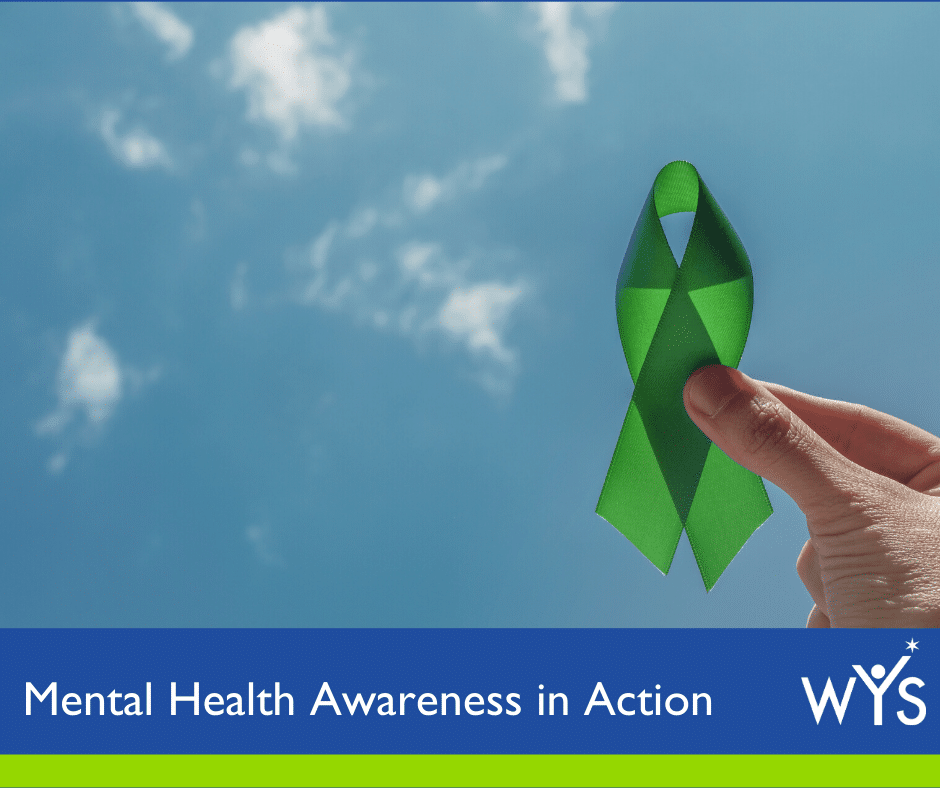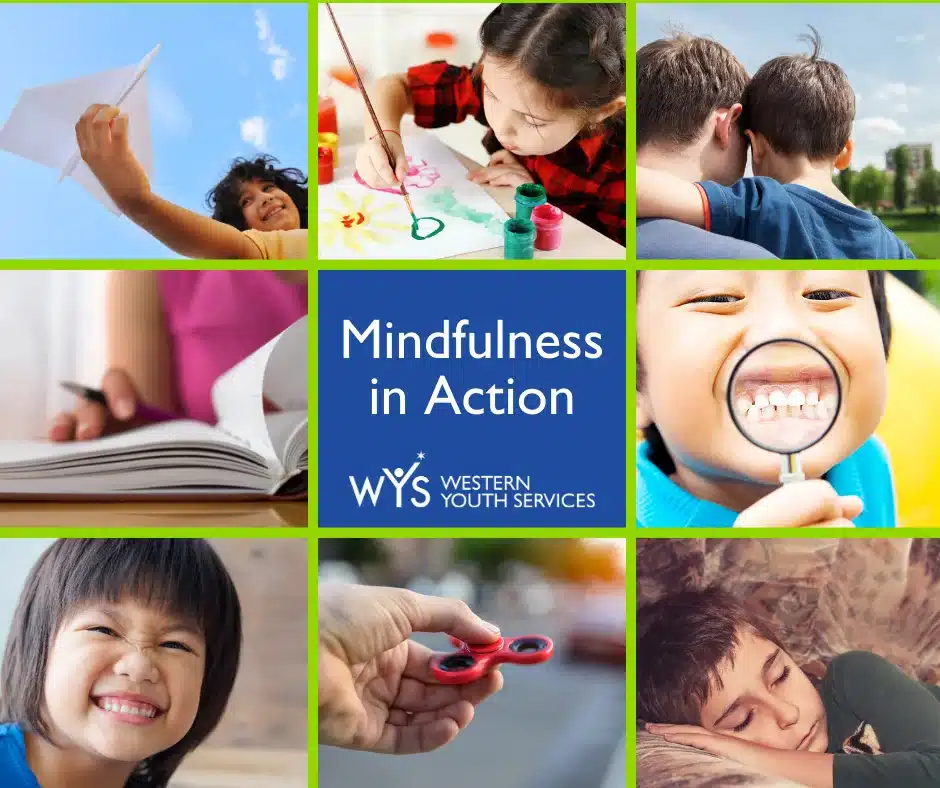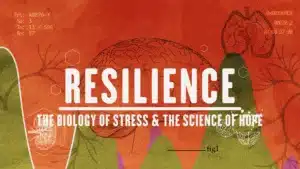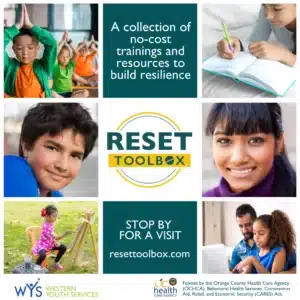
Mental Health Awareness in Action
Mental health awareness and education are paramount to our daily work. Throughout the pandemic, two things kept rising to the top (1) mindfulness and (2) people want to learn more about mental health.
This article includes some of the mindfulness techniques that we use with our clients, in our programs, and in our educational trainings. They are easy to incorporate into your day and anyone can learn how to use them.
We’ve also included information on ongoing educational programs and trainings that are provided at no cost and open to the public. Those who may benefit are:
- Children, youth, and families residing in Orange County
- Public/private schools, child care sites, colleges/universities
- Veteran service agencies, law enforcement, homeless/housing providers, religious/faith-based centers
- Nurses, doctors, mental health providers, and clinicians
Mindfulness in Action
Did you know that it’s commonly thought that most new habits take about 21 days to form. During COVID-19, for many of us, our habits were disrupted and this may have contributed to increased feelings of stress and anxiety. The change and uncertainty we’ve collectively experienced have had an impact on our regular routines like sleeping, exercising and/or eating. As we start to get ‘back to life,’ what if we all listened to what we evaluate our habits and maybe even intentionally or ‘mindfully’ uplevel them.
Mindfulness is not just a buzzword for meditation, it includes various different simple techniques that can easily be incorporated into your day. These techniques are actually a series of habits.
The first step is to start to be ‘mindful’ of triggers that make you feel anxious or stressed, then instead of allowing that feeling of anxiety to take over, stop, take a deep breath, and ‘mindfully’ incorporate one of the techniques. As you continue to do this exercise of stopping, breathing, and replacing, you’ll start to build a new, positive habit.
Mindfulness is not a one-size fits all solution, different techniques work for different people. We provided a few resources so you can find what works best for you and your family. Below are several mindfulness techniques and resources. Give one or two a try.

Sparking Joy
- According to Mindful.org, “Joy is an intrinsic attitude of mind that includes gladness of the heart, softheartedness, and tenderness that supports a capacity for appreciation, contentment, and gratitude. Just as our hearts can tremble in the face of suffering, they can also tremble in the face of happiness and beauty. Its effective tone is gladness, aliveness, and vitality. It is associated with a range of emotions, including contentment, wonder, radiant pride, gratitude, and delight.”
- What brings you joy?
- How can you bring more joy into your world?
- How can you bring joy to others?
Sleep
- Sleep and rest are crucial to well-being. It’s not always easy to get a good night’s sleep, especially now.
Breathing
- There are many breathing exercises. One quick and easy one is called box breathing, a powerful, yet simple, relaxation technique that when anxious, will calm your breathing and help you relax.
- Close your eyes. Breathe in through your nose while counting to four slowly. Feel the air enter your lungs.
- Hold your breath inside while counting slowly to four. Try not to clamp your mouth or nose shut. Simply avoid inhaling or exhaling for 4 seconds.
- Begin to slowly exhale for 4 seconds.
- Repeat three times or until you feel calm.
Journaling
- Journaling is simply writing to declutter your mind, organize our thoughts, and set achievable goals. It’s amazing how when we see the words on paper or on the screen, rather than hear the inner dialog, we find solutions and make better choices. Here are a few ideas to get started, because a blank page can sometimes be intimidating:
- What makes you feel safe?
- What is something you want to do but haven’t because of fear? How can you overcome it?
- What songs make you happy?
- What are you grateful for?
- Who is your Mental Health Champion?
- List compliments you’ve received.
- Where are you happiest? Describe the spot.
- Write a letter to someone you miss.
For event more ideas, this article includes 25 fun mindfulness activities for children and teens.
Mental Health Events
The Behavioral Health Training Collaborative
The Behavioral Health Training Collaborative (BHTC) provides a series of complimentary virtual trainings for residents of Orange County. The events are available to the general public, including individuals, groups, and health care professionals covering a range of topics including but not limited to: Mental Health First Aid, Mental Health 101, Suicide Prevention, Teacher-Child Interaction Training, Strong Families/Strong Children Military Program, Understanding Adverse Childhood Experiences (ACEs), Preventing Homelessness in LGBT+ Youth, and more.
BHTC is a collaboration between WYS and a group of Orange County Mental Health Champions who have integrated their knowledge and resources to close the gaps between agencies. The collaboration consists of representatives from WYS, Child Guidance, Multi-Ethnic Collaborative of Community Agencies, National Alliance on Mental Illness OC, OMID Multicultural Institute for Development, and Seneca Family of Agencies.
The community expressed a need for mental health training opportunities and it made good sense to gather the best that Orange County had to offer. Each agency brings their resources, knowledge, and area of expertise to the mix to work together and respond to the need by providing integrated training programs that make a bigger impact. BHTC has an ongoing schedule of trainings and also coordinates requests for targeted trainings to groups of all sizes.

After COVID-19, our trainings will return to community sites and are offered in more than 80 community locations. Let us train your team virtually or on-site (after COVID-19). If you don’t see the type of training you are looking for in our upcoming calendar of events, simply fill out this form and we’ll contact you to create a tailored training specifically for you.
Past attendees have shared:
I was so grateful to learn how to help heal the cycle of trauma not only in my own family but with my community members as well.
I’ve had personal experience with family members having mental health diagnoses and the BHTC training was very impactful in helping me to better understand how to support them.
In one training for nursing students, a participant shared that the information presented might help her professionally, as well as, with family and friends. It’s an invaluable resource!
Another attendee who runs her own non-profit to help children who have been bullied learned about the importance of developing psychological safety in a room. She now felt more confident in creating a safe space for the young girls she serves to better lead them through a transformational outcome.
Resilience: The Biology of Stress & The Science of Hope

Resilience: The Biology of Stress & The Science of Hope is a documentary that reveals the effects that toxic stress can have on the brains and bodies of children and the impact on their lives. Resilience chronicles the movement of adverse childhood experiences (ACEs) and trauma-informed care. These are both pillars of the work we do at WYS.
We host regular screenings of this film, visit the BHTC website to learn about upcoming events.
Watch an introductory video of Resilience to learn more.
The RESET Toolbox
RESET stands for Resilience: Essential Social-Emotional Trainings. It’s a collaborative collection of resilience-building resources and trainings to minimize anxiety and build resilience in children and teens.
The RESET Toolbox includes no-cost trainings for families, educators, school/district administrators, K-12 students, community members, youth-serving organizations, and collaborative agencies. Some of the topics include: cyber-safety, technology trainings for parents/caregivers, building resilience, relationship building, conflict resolution, social-emotional learning… and so much more.
There are 100s of resources, visit the RESET Toolbox and learn new ways to help our kids thrive.
To Your Mental Wellness
In addition to these resources, we are always finding new ways to promote mental wellness that we share on our social media channels and via our newsletters. Regardless of the resource or technique that speaks to you, try something new and let us know how it goes.
As always, we are here to help!

Lorry Leigh Belhumeur, Ph.D.
Chief Executive Officer
Western Youth Services
All BHTC training courses and O&E workshops are funded by Orange County Health Care Agency (OCHCA), Behavioral Health Services, Prevention & Intervention, Mental Health Services Act/Prop. 63.








